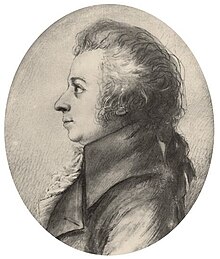Der Hölle Rache

"Der Hölle Rache kocht in meinem Herzen" (English: Hell's vengeance boils in my heart) is an aria for the Queen of the Night in Mozart's opera The Magic Flute (German: Die Zauberflöte). Mozart's friend Emanuel Schikaneder wrote the words. The aria is written in D minor. The voice ranges over two octaves. It is known for being difficult to perform well. Mozart's sister-in-law Josepha Hofer was the first to sing the aria on stage.
Music[change | change source]
The Queen of the Night is a role for a coloratura soprano. She has two arias in the opera. The other is "Oh, tremble not, my beloved son" (O zittre nicht, mein lieber Sohn). Both arias are famous. "Hell's vengeance" is highly memorable, fast paced and menacingly grandiose.
The aria is written in D minor. It is scored for pairs of flutes, oboes, bassoons, horns, trumpets, timpani, and the string section. It is a larger orchestra than that for "O zittre nicht". It comprises all the players from the opera as a whole, except the clarinets and trombones.
The aria is sung in act 2. It is famous for being difficult to perform well. The Queen of the Night is in a fit of rage. She gives a knife to her daughter Pamina. She tells her to kill the priest Sarastro. If she refuses, the Queen will curse her. The aria's range is two octaves, from F4 to F6 and requires a very high tessitura.
First performance[change | change source]
The first singer to perform the aria onstage was Mozart's sister-in-law Josepha Hofer. She was 33. Mozart wrote the two Magic Flute arias to showcase her voice. He was very impressed with Hofer's performance. In the fifth week of the opera's run, Mozart lay dying. He whispered to his wife Constanze on December 4, 1791: "Quiet, quiet! Hofer is just taking her top F; – now my sister-in-law is singing her second aria, "Der Hölle Rache"; how strongly she strikes and holds the B-flat: 'Hört! hört! hört! der Mutter Schwur!'"[1]
Lyrics[change | change source]
The words were written (in German) by Mozart's friend Emanuel Schikaneder, who also played Papageno in the first performances.
Der Hölle Rache kocht in meinem Herzen, |
Hell's vengeance boils in my heart; |
References[change | change source]
- ↑ "Die Verdienste des Herrn Schikaneder", Hamburger Abendblatt (3 January 1994)

